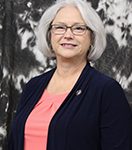Monica M. Morehead
Monica M. Morehead
- RNCredentials: BSN, RN
Place of Employment: Anderson University
Which Nursing Organizations are you currently a member of: NASN, SCASN, STTI
Board(s) currently serving on: National Alliance on Mental Illness- AOP
Tell us about your journey to the boardroom. What inspired you to seek a leadership position?
I was the original President for this organization as a mental health volunteer advocate prior to becoming a nurse from 2001-2009. Under my leadership, we developed a BOD and bylaws. I stepped completely off the board to return to school to become a psych nurse and begin to advocate on a different level while continuing to my role as an advocate and speaker for mental health. As a faculty advisor for NAMI-On-Campus, I recently attended our NAMI-AOP BOD meeting and was saddened to see the disenchantment from the original goals of this organization and began to feel the pull to consider coming back to the board and support however I was needed. About the same time, one of the current leaders called and asked if I would step back into the role of President to re-energize the Board and encourage collaboration and cooperation. I spoke with my family and a few close colleagues who know my passion and supported this decision. I am very passionate about mental health issues and challenges face by individuals living with mental illness and the providers that care for them. My goal is to re-ignite the fires of this same passion in others, so we can continue to be the strong voice for those unable to speak for themselves.
What are you doing to ensure you continue to grow and develop as a leader?
As a new nurse educator, I am constantly reading and immersing myself in educational opportunities for leadership as well as aligning myself with mentors that will assist and encourage my endeavors. This has carried over in how I am preparing for stepping back into this leadership role.
What impact have you had serving on a board? Example?
As a mental health advocate serving on the NAMI-AOP board, I have seen laws enacted to protect rights of the mentally ill in our state such as parity and protecting our patient’s rights to continue on medications already proven effective without having to go through generic medication trials which might lead to destabilized level of functioning leading to additional hospitalization and lost productivity within a patient’s community. We have developed a positive relationship with our legislators and local community members that creates a WE culture rather than US vs. THEM which, in my opinion, is the best culture to bring about positive change.
What advice would you give someone going into a board leadership position for the first time?
Determine what is your passion and how you will use this passion to help guide your board and organization to attain its mission and vision. You have been asked to serve. What did others see in you and how will you use that to serve.
What are a few resources you would recommend to someone looking to gain insight into becoming a better leader and eventually obtaining a board position?
The non-profit organization I work with has great resources developed through it’s many years of existence. It is not necessary to re-invent the wheel. Check the resources already available within your organization. Consider individuals you identify as great leaders and read works they have written or works written about them then model those characteristics you identify as helpful in your role.
Why do you feel it is important for nurses to serve on boards?
Nurses bring compassion which leads to balance when advocating for social justice issues. When a nurse walks into a room, he/she is already assessing the situation for strengths, weaknesses, personalities, and subtle hints of what to anticipate. Our critical thinking skills and planning process may be instrumental in organizing and achieving goals for our organization.
What do you think is the most significant barrier to nurses serving on boards?
A significant barrier to nursing serving on a board is our perfectionistic tendency. As a nurse educator, I see nursing students always want the A. In our professional careers, we are striving to be the best. It’s simply not possible to be all things to all people and the best in every situation. I see this causes us to sometimes spread ourselves too thin over many projects rather than decide what we really excel at and focus on that one item. In doing this, we give ourselves permission to accept our limitations and reduce our fear of failure.
Monica M. Morehead RN May 16, 2018
Boards: National Alliance on Mental Illness- AOPContinue Reading
“Board service can be rewarding to nurses both personally and professionally. It not only requires them to exercise leadership; it expands those skills and advances their capabilities and knowledge. It gives nurses the chance to meet people and enhance their professional networks. And it can be inspirational and empowering.”
-Sue Hassmiller, PhD, RN, FAAN, Robert Wood Johnson Foundation

